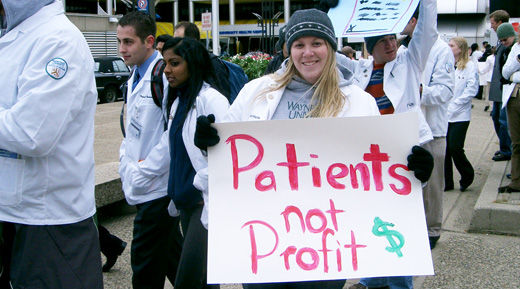
MADISON HEIGHTS, MICH – Misinformation about the Patient Protection and Affordable Care Act (the new Federal health care legislation) is rampant. To begin to counter that, Jobs with Justice and the Michigan AFL-CIO Health Care Committee organized a workshop to arm labor and health care activists with the facts.
Held in the National Association of Letter Carrier’s union hall, the well attended meeting was led by John Freeman, State Director of Health Care for America Now and Marjorie Mitchell, Executive Director of Michigan Universal Health Care Access Network.
A campaign worker for Democratic Congressman Gary Peters, who the Tea Party has targeted for defeat, said knowledge of the bill would help her in the door-to-door work she’s doing in Peter’s district.
Freeman agreed that a “serious education plan” is necessary. He noted that after any major legislation is passed there are always gaps that have to be addressed with regulations. “This is where the right wing is organizing. Progressive groups who worked to pass this bill have to stay together to determine the regulations. Republicans are trying to make the elections revolve around the health care.”
Freeman said the bill had compromises and is not all we wanted but “this bill does do a lot of things the insurance industry doesn’t like.” After hearing an explanation of those good things, I can understand the insurance companies’ oppositions.
For example, companies can no longer deny coverage for pre-existing conditions. This part of the law takes affect for children in 2010 and adults in 2014.
Young adults ages 18 to 26 can now be covered on their parents’ plans. They don’t have to live at home or be in school and it starts this month.
Those on Medicare won a victory with the elimination of the costly donut hole (the gap between $2500 and $6000 where accumulated prescription costs are not covered). It is being gradually phased in until 2020 but checks for $250.00 (the reimbursement for 2010) have already been sent.
Very importantly and unknown to most, this legislation has preventive care built into it. Those on Medicare will receive a free annual physical and no co-pays on screenings such as colonoscopies. The legislation also puts an emphasis on having more primary care physicians.
An expansion of Medicaid will cover millions more by raising the eligibility level to $14,404 for individuals and up to $29, 327 for families (133% of the federal poverty level). Importantly, it will also raise the reimbursement rates for doctors treating Medicaid patients to be comparable to Medicare reimbursements. Many doctors are unwilling to serve Medicaid patients because of the low payments.
In 2014, health insurance “exchanges” will open for families and individuals to purchase insurance. Each state will have its own and each will offer four categories of plans ranging from basic to best.
Those who do not qualify for Medicaid (exceed the income thresholds) will be provided subsidies to purchase health care. It is on a sliding scale and will be a real savings for many. For example, a family of four who earns $30,000 would pay approximately two percent of their income to purchase insurance while the same family making $88,000 would pay approximately 9.5 percent – still a significant savings from what one would pay today.
Money will also be provided “up front.” No one will be forced to forgo the rent or mortgage while waiting for a reimbursement of a health insurance payment.
Insurance companies will be forced to describe their plans in the same format and in understandable English. This was done to make it easier to contrast and compare policies from different companies. Plans will be available on websites and in hard copy. It is hoped this procedure will create a more competitive market. Freeman said anyone who has tried to decipher their current policy knows it’s an almost impossible to task.
Mitchell said, “It is not a perfect bill and it will need lots of work in the future; it’s a first step. But it will bring peace of mind for people. They no longer will have to worry about being denied coverage for prior medical conditions and won’t have to fear being bankrupted by high medical bills.”
The bill is a step forward; continuing that progress will be a constant fight.
The legislation is complicated and three websites were recommended by the presenters and others to help sort things out: http://familiesusa.org/ http://www.healthcare.gov/ and http://kff.org/ (the Kaiser family foundation on healthcare).
Photo: John Rummel










